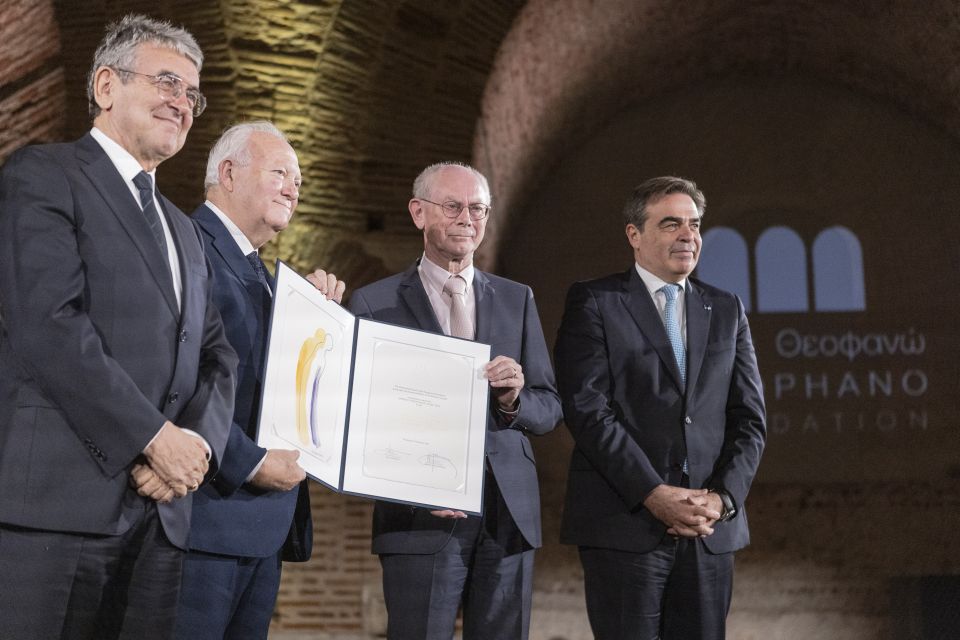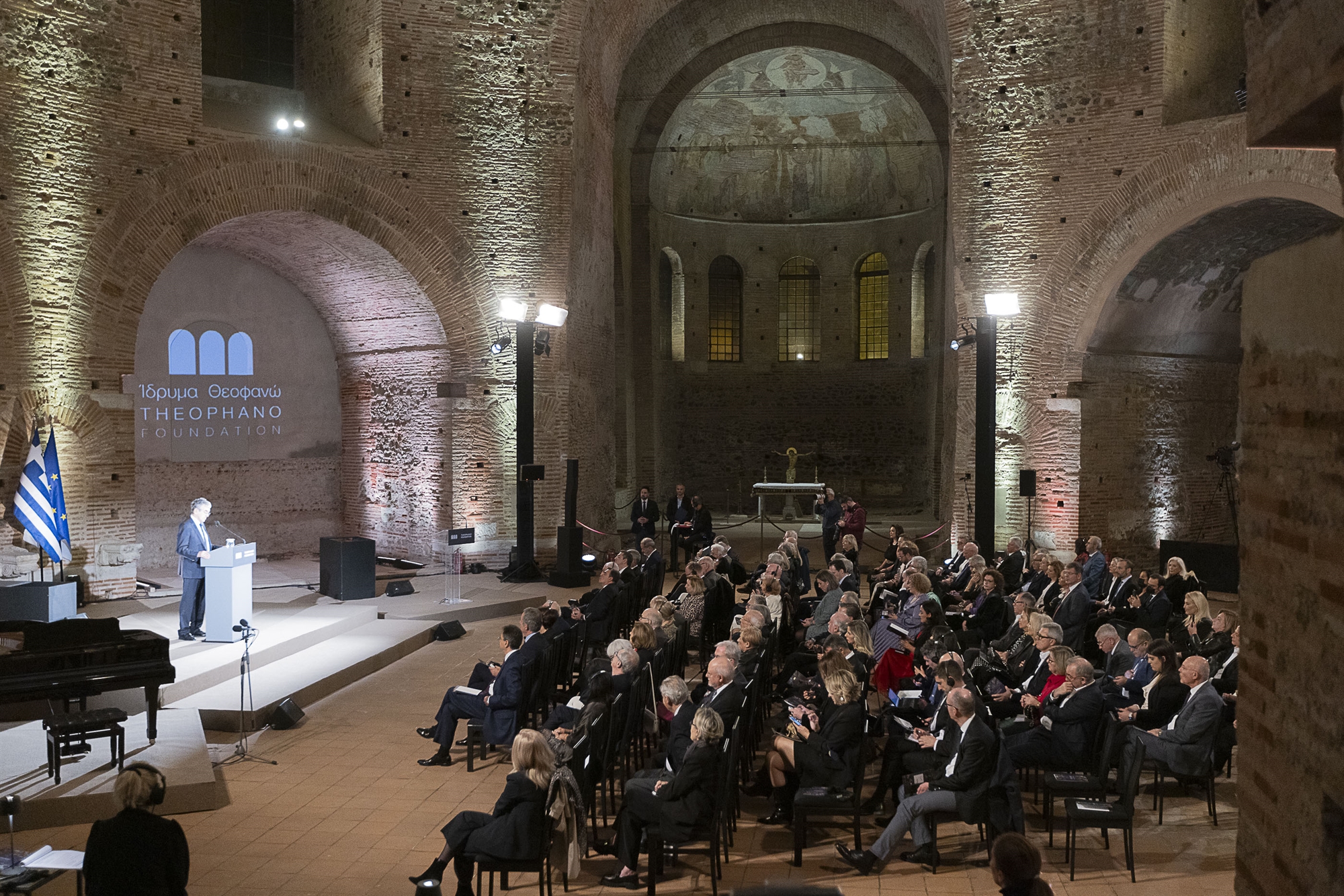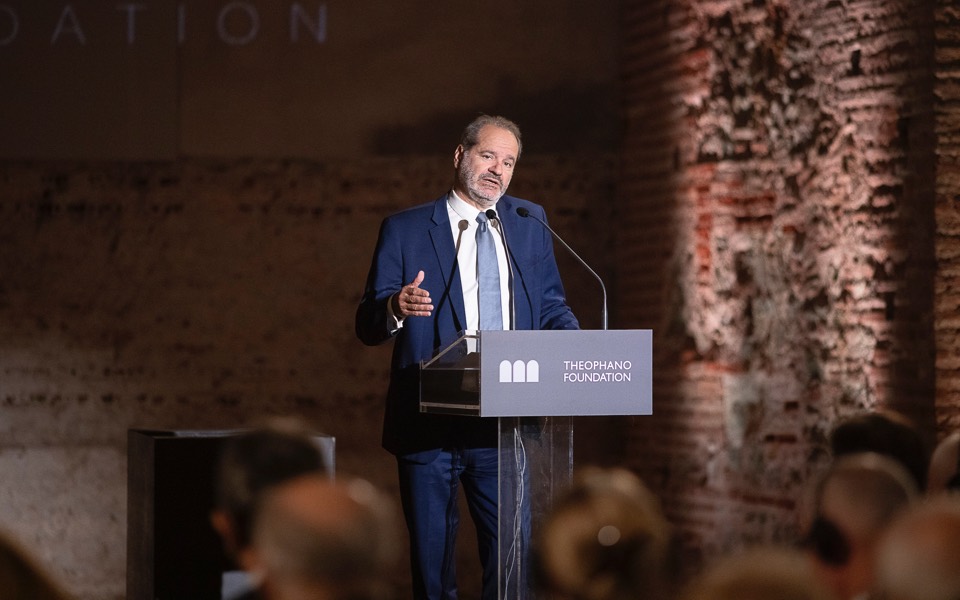Empress Theophano Prize bestowed on United Nations
Antonio Guterres remotely accepts award for organization’s role, in brilliant ceremony at Thessaloniki’s Rotunda, a monument of multiculturalism

In the fourth award ceremony of the pan-European Empress Theophano Prize, which took place in Thessaloniki on Thursday evening, attention was not on the stunning Rotunda, the city landmark that served as a temple in Roman times, a Christian church in the Byzantine era and a mosque under Ottoman rule; nor was it on the distinguished guests who attended the event.
Attention at the ceremony awarding the United Nations – in the name of its secretary-general Antonio Guterres – was, instead, firmly focused on the challenges being faced by Europe and the world right now.
“This is a very important day for the prize, in our opinion. The awarding of a personality like the secretary-general of the United Nations demonstrated our appreciation for the individual but also the importance of his role in such troubled times,” the chair of the Theophano Foundation’s Governing Council, Stavros Andreadis, told Kathimerini.
‘Democracy is under threat and authoritarianism is on the march. Inequalities are widening, tensions are rising and our planet is burning. No country can meet these challenges alone’
“Here is an organization that does everything it can to ensure that all these terrible things happen less and to find pathways leading to just and proper solutions that will avert violence,” he said, adding that Europe’s voice needs to be heard more on such matters. “There is a void here,” which the Empress Theophano Prize seeks to address in its own small way, noted Andreadis.
Accepting the award in a video message, Guterres noted that “our world is facing great trials and tests. War has returned to the European continent with the Russian invasion of Ukraine. And all around the globe, old tensions fester while new risks emerge. Democracy is under threat and authoritarianism is on the march. Inequalities are widening, tensions are rising and our planet is burning. No country can meet these challenges alone. We need greater unity and cooperation, rooted in mutual respect and solidarity. And we need political will and leadership.”
At the award ceremony, Guterres was represented by Miguel Angel Moratinos, under-secretary-general of the UN and high representative for the United Nations Alliance of Civilizations (UNAOC), who noted, among other things, that multinationalism and multiculturalism should not be regarded as threats. He also underscored the need for more tolerance and condemned anti-Semitism and Islamophobia.
“We are witnessing a situation where a human catastrophe is unfolding every minute in front of our eyes,” he said. “I am alarmed at the surge in religious intolerance and hate crimes, especially those targeting Jews, Muslims and Arabs around the world in the context of the dangerous escalation of the situation in the Middle East. I unequivocally condemn attacks, hate crimes and harassment against Jews, Muslims and Arabs, and the destruction or desecration of their places of worship. The rise in online hate content, disinformation and conspiracy theories is appalling and distressing.
“I echo the call of the secretary-general of the United Nations to uphold human dignity and to stand up to the forces of anti-Semitism, anti-Muslim bigotry and all forms of hate,” added Moratinos, who also sat down with Kathimerini for an exclusive interview.
The chair of the Theophano Foundation’s Advisory Committee, Honorary European Council President and former prime minister of Belgium Herman Van Rompuy, stressed that the United Nations has been the world’s best answer to strife since World War II. He also noted, however, that “since February 24, 2022, when Russia invaded Ukraine, events have shown that we are on the errant track.”
War and climate change are the biggest threats we face today, he said, adding that humanity’s destiny “is in our hands.”
“Power is always temporary and superpowers even more so, so they should encourage humility and wisdom,” Van Rompuy said.

Speaking about the prize, the regional governor of Central Macedonia and former vice president of the European Committee of the Regions, Apostolos Tzitzikostas, described it as “an institution that promotes European ideals.”
The most poignant speech of the evening, however, came from the ceremony’s first speaker, European Commission Vice President Margaritis Schinas.
Drawing a parallel with last year’s prize, which was awarded to conductor Daniel Baerenboim, whose orchestra brings together musicians from Israel, Palestine and other countries of the Middle East, Schinas spoke of the importance of bridges between people and governments.
“The world is a better place thanks to the UN; lives have been saved, lives have been protected and lives have acquired prospects,” he said, noting that the organization’s presence may be quiet in many areas and parts of the world, but its absence would be deafening.
Schinas also roundly condemned recent vandalism attacks on the mural commemorating the Holocaust at the Thessaloniki train station and on the Star of David monument, saying that there is “zero tolerance for anti-Semitism and zero tolerance for intolerance.”
In particular, he mentioned the location of the award ceremony, noting that the UN’s work was being honored in a city that “has looked after the persecuted of this Earth and of people who appear diametrically opposed to each other.”

He also wished the organization longevity and strength to keep fighting the good fight, noting that Europe both “propagates and supports these efforts.”
The ceremony was moderated by Kathimerini English Edition’s editor-in-chief, Tom Ellis.






